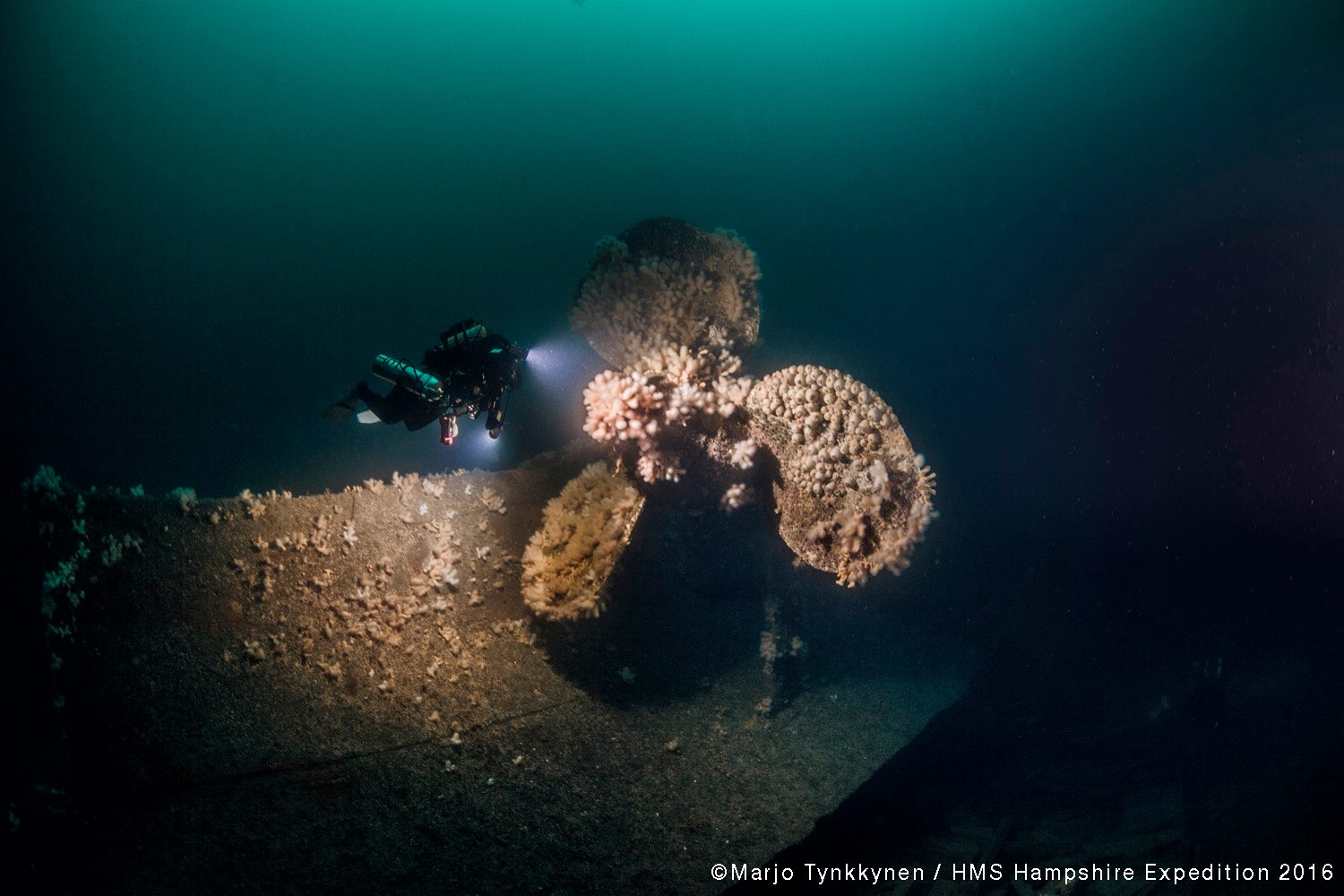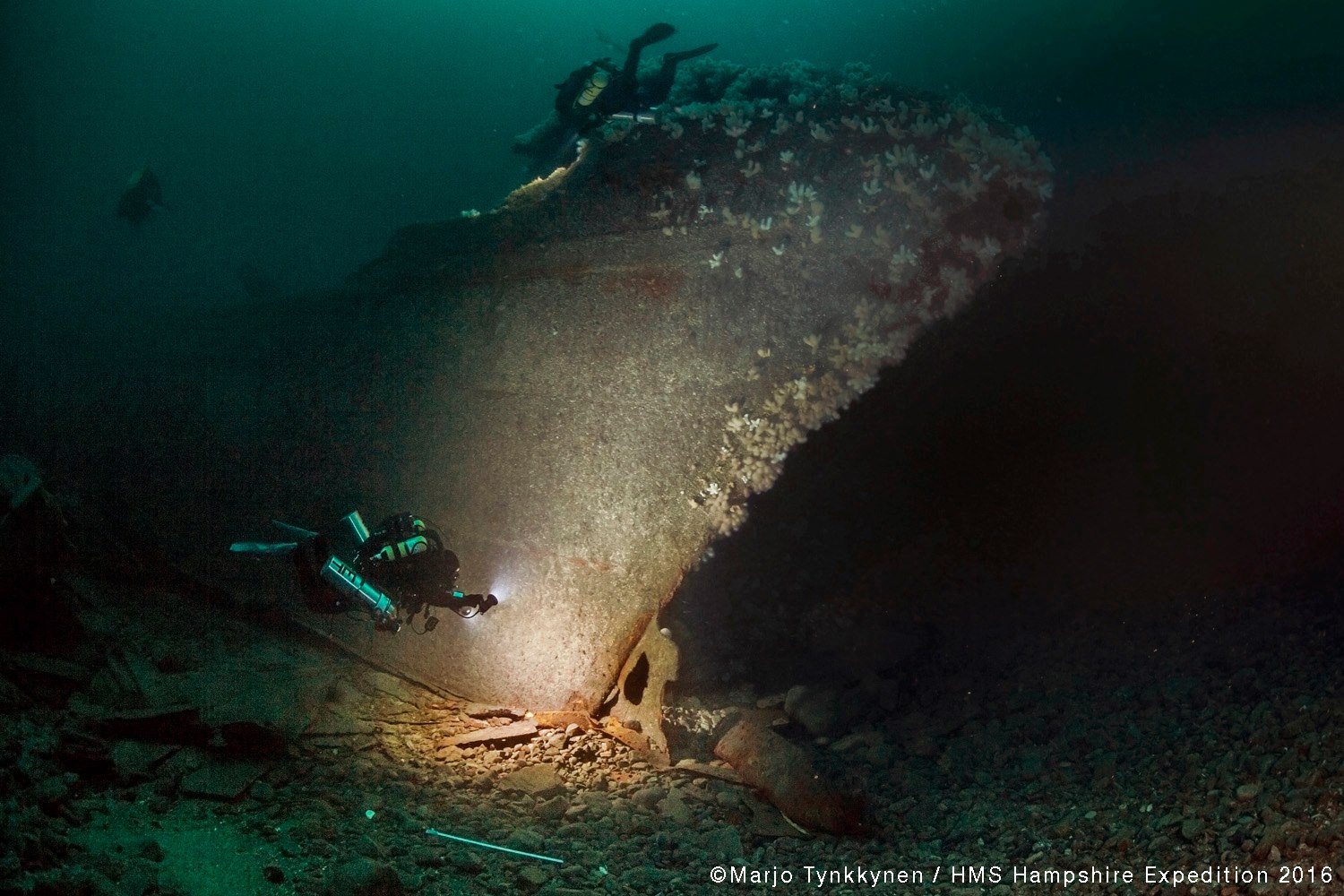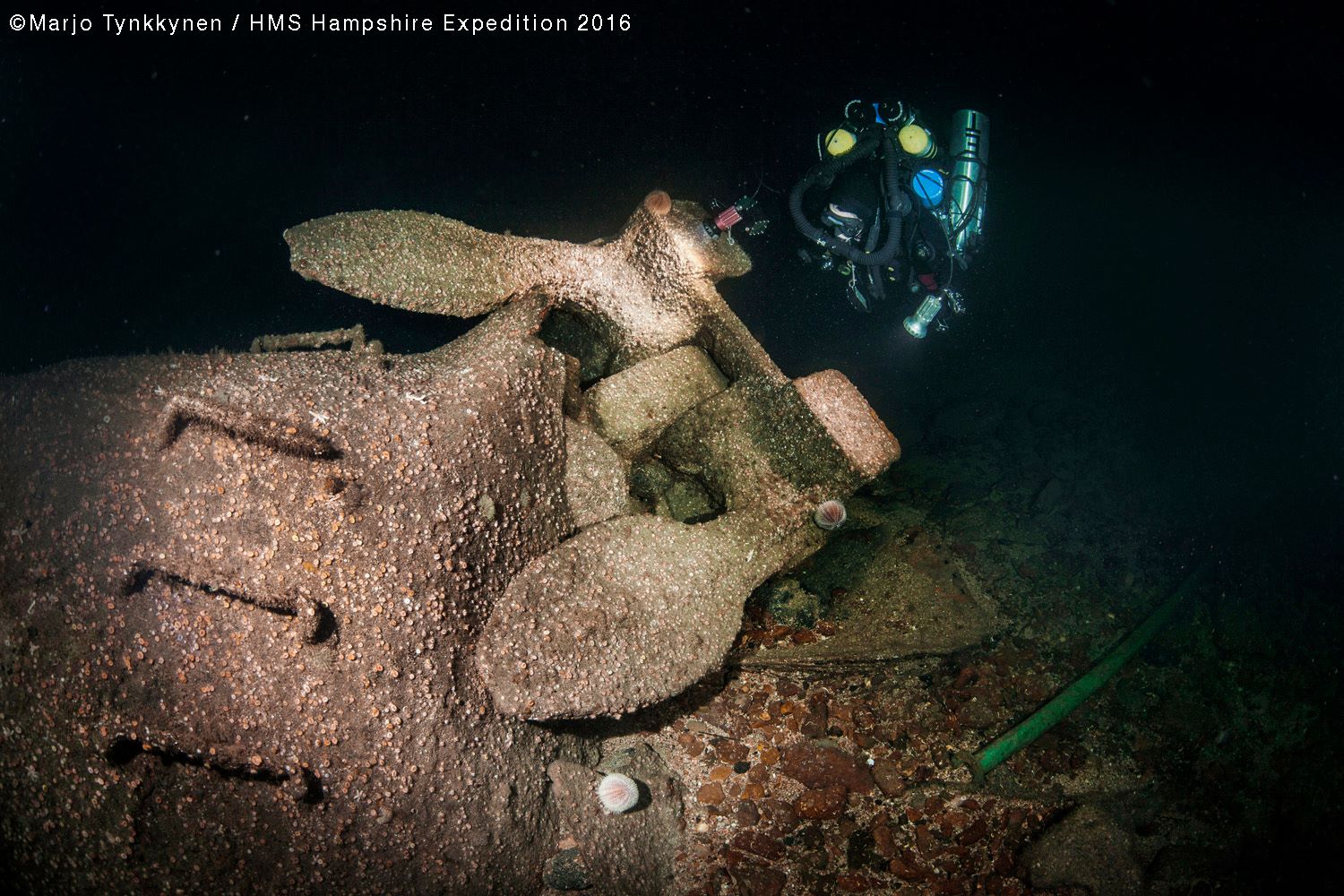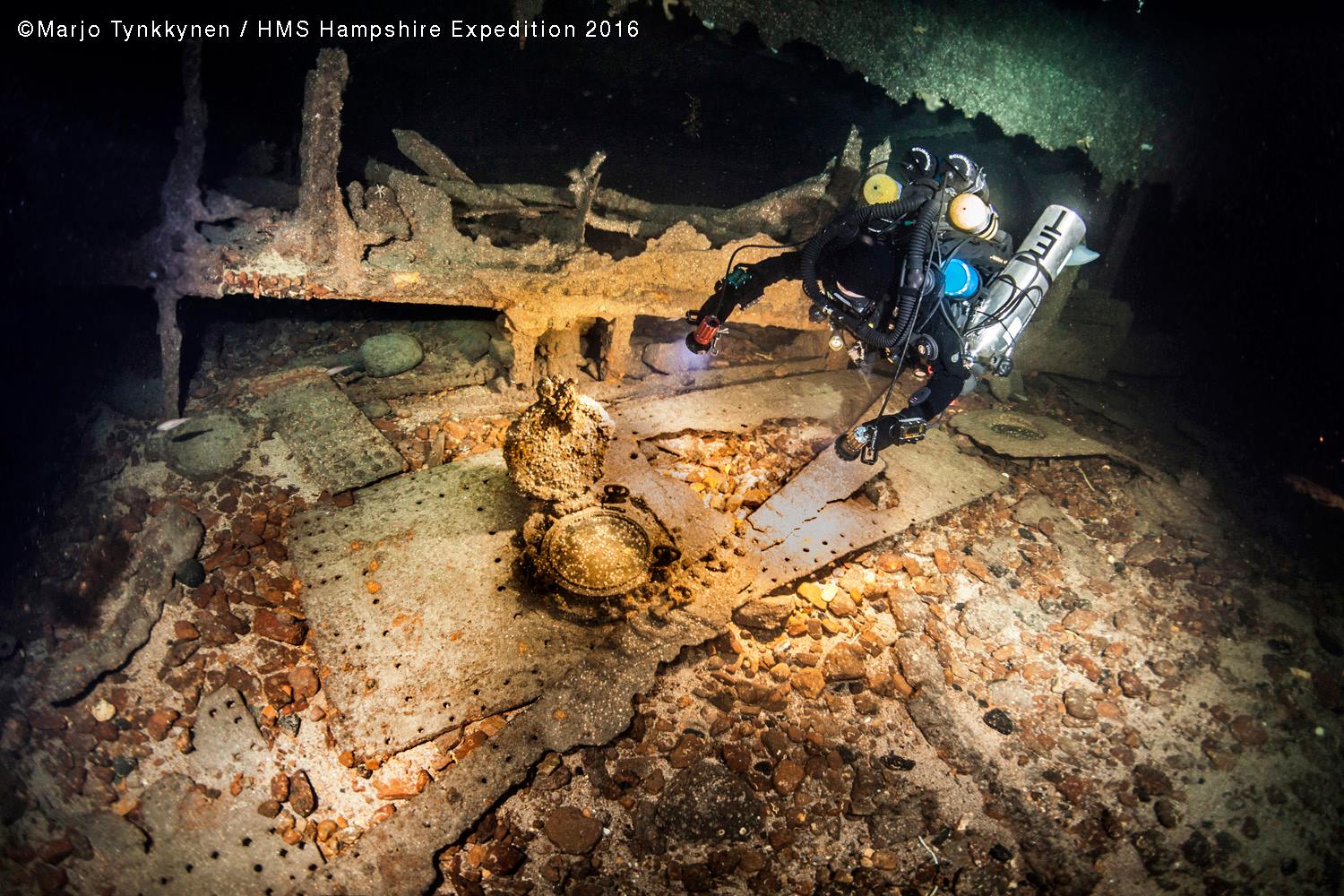News
Divers Complete A Photographic & 3D Photogrammetry Survey of HMS Hampshire

A specialist diving team from the UK and Finland has completed a detailed photographic and 3D imaging survey of the shipwreck HMS Hampshire.
The 10,850-ton armoured cruiser HMS Hampshire departed Scapa Flow in Orkney on 5 June 1916 on a voyage around the north cape of Norway to the port of Archangel in northern Russia. She was carrying Lord Kitchener and his staff to Russia to discuss mutual war aims and strategy. As she struggled up the west coast of Orkney in a severe gale, approximately one and a half miles off Marwick Head she struck a mine laid by the German Submarine U-75 a week before on 29 May and quickly sank. Of the 749 people aboard, only 12 managed to reach the shore alive; Lord Kitchener and his staff were lost.
Today HMS Hampshire lies at a depth of approximately 70m (230ft) near the North West tip of Orkney in an exposed area open to North Atlantic storms and strong tidal flows. Despite the challenges, over a two-week period that poignantly covered the 100th anniversary commemorations of her sinking, the team undertook over 200 hours of diving.
Expedition Leader Rod Macdonald, an internationally renowned diving author and Director of Wreck-X (Shipwreck Explorers) explains:
“The story of HMS Hampshire is of historical importance and her loss forms an important element of the WWI naval story. In recognition of this, the prestigious Explorers Club awarded the expedition Explorers Club flag No 192. All major explorations since early 1900’s have carried with them an Explorers Club flag, including expeditions to the Poles, Everest and the Moon. Flag No 192 was carried on 22 previous expeditions to Polar Regions, the Himalayas and has crossed the Atlantic twice by hot air balloon.
HMS Hampshire is a controlled wreck under the Protection of Military Remains Act 1986 and no diving is permitted. To enable the survey to be undertaken, the UK Ministry of Defence granted the expedition a special licence. Diving was conducted from the new purpose built dive vessel MV Huskyan, based in Stromness, Orkney. For the first time a 3D photogrammetry survey of a shipwreck of this size has been attempted and the preliminary results are impressive with new information coming to light on her sinking and subsequent decay. This information will now be used to compile a detailed written and visual survey report, which will be made available to the UK Ministry of Defence, local Orkney museums and Historic Scotland.
As we commemorate WWI and in particular the 100 year anniversary of her sinking, we hope that this survey data will add to our knowledge of this historic warship and help maintain the memory of HMS Hampshire and the sacrifice made by her crew.”
Photos: Marjo Tynkkynen
Gear News
Introducing the TR-80, IR-50 and CS-30 Regulators from DYNAMICNORD

Whether you are a beginner or a professional diver – with the three new main regulators from DYNAMICNORD, everyone will find their favourite regulator. They all look super stylish.
Excellent performance with the TR-80
Quality and performance are the be-all and end-all for regulators. It is not for nothing that the TR stands for Tec Reg. The innovative design of the TR-80 guarantees absolute reliability – even in ice-cold waters.

Perfect breathing effort at 0.8 J/l / certified for diving in waters below 10 degrees / structural design made of solid brass for best cold protection / membrane-compensated design with dry seal of the first stage / reduced exhalation effort thanks to optimized exhalation membrane and bubble deflector / adjustable Venturi (dive/predive) and adjustment knob for individual inhalation comfort / innovative design of the front cover prevents free-flow in strong currents or when diving with scooters / design made of sandblasted brass, matt chrome finish / 2 HP and 4 LP outlets / mouthpiece made of high-quality, anti-allergic silicone for maximum comfort.


Amazing underwater adventures with the IR-50
The IR-50 is the top regulator for advanced and experienced divers. Natural breathing is the essence of this regulator.

Ideal breathing effort at 0.8 J/l /certified for diving in waters below 10 degrees / compensated membrane / adjustable venturi (dive/predive) and adjustment knob for individual inhalation comfort/ outlet valve and deflector for minimum exhalation effort and reduction of bubbles on the face / design made of sandblasted brass, matt chrome finish / 2 HP and 4 NP outlets / mouthpiece made of high-quality, anti-allergic silicone for maximum comfort.


The Workhorse – our CS-30
For diving centres and diving beginners – the workhorse stands for strong construction, reliability and robustness. Perfect for your training.

Optimal breathing effort at 0.8 J/l /recommended for diving in waters above 10 degrees / non-compensated piston / adjustable venturi (dive/predive) / outlet valve and deflector for minimum exhalation effort and reduction of bubbles on the face / design made of sandblasted brass, matt chrome finish / 1 HP and 3 NP outlets / mouthpiece made of high-quality, anti-allergic silicone for maximum comfort.


Octopus OP-30
The OP-30 is the ideal addition to all DYNAMICNORD regulators. It is identical in construction to the CS-30.

The TR-80, IR-50, CS-30 (DIN & INT) regulators and the Octopus OP-30 are available from DYNAMICNORD dealers and in the online store.
DYNAMICNORD – Your Outdoor Companion.
Marine Life & Conservation
Paul Watson Released as Denmark Blocks Japan’s Extradition Bid

Renowned anti-whaling activist Paul Watson has been released from custody in Greenland after spending five months in detention. Denmark’s Justice Ministry rejected Japan’s request for his extradition, citing insufficient guarantees that his time already served in custody would be credited against any potential sentence.
The 74-year-old Canadian-American was arrested on July 21 in Nuuk, Greenland’s capital, when his ship docked to refuel. His arrest was based on a 2012 Japanese warrant related to a 2010 encounter in Antarctic waters. Japan alleged Watson obstructed operations and caused damage to a whaling research ship during efforts to disrupt illegal whaling. Watson has consistently denied these claims, maintaining his commitment to marine conservation.
Denmark, which oversees extradition matters for Greenland, concluded that while the legal conditions for extradition were met, the lack of assurances from Japan regarding time-served credit made extradition untenable.
In a video shared by his foundation, Watson expressed gratitude and relief, saying, “After five months, it’s good to be out… and good to know they’re not sending me to Japan.” He added that the most difficult part of his time in custody was being separated from his two young sons.
Watson is a pioneering figure in marine conservation, known for founding the Captain Paul Watson Foundation in 2022 after decades of activism with the Sea Shepherd Conservation Society. His bold efforts to defend marine life have earned him widespread support, including from celebrities and conservationists. His work has also been featured in the acclaimed reality TV series Whale Wars.
Watson’s lawyer, Jonas Christoffersen, praised the decision, stating, “We are happy and relieved that Paul Watson is now free.” He added that Watson is eager to reunite with his family and continue his vital work.
The arrest occurred while Watson’s vessel, the M/Y John Paul DeJoria, was en route to the North Pacific with a team of 26 volunteers to intercept a Japanese whaling ship. His foundation described the arrest as politically motivated and emphasized that Watson’s actions were focused on ending illegal whaling practices.
Japan resumed commercial whaling in 2019 after leaving the International Whaling Commission, asserting that whale meat is a cultural tradition. Conservationists, however, continue to challenge these practices, highlighting their impact on marine ecosystems.
Despite the challenges, Watson remains steadfast in his mission to protect marine life and bring attention to whaling practices. His dedication to ocean conservation has made him a globally respected advocate for the environment.
-

 News2 months ago
News2 months agoIconic SS United States to become the World’s Largest Artificial Reef
-

 News3 months ago
News3 months agoBook Review – 52 Assignments: Underwater Photography
-

 Gear News3 months ago
Gear News3 months agoDYNAMICNORD – New German diving brand enters the British market
-

 News3 months ago
News3 months agoExploring Cenote El Pit: A Diver’s Dream
-

 Gear News3 months ago
Gear News3 months agoTry BARE drysuits (and maybe even win one!) this Friday with Sea & Sea at North West Dive Fest
-

 Marine Life & Conservation3 months ago
Marine Life & Conservation3 months agoBook Review: Coral Triangle Cameos
-

 Blogs2 months ago
Blogs2 months agoDive the Egyptian Red Sea this Autumn with Regaldive
-

 News3 months ago
News3 months ago2024 Ocean Art Underwater Photo Competition Announced















